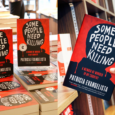As the government moves to address the hunger situation, the private sector is also taking steps to help solve this problem.
Last August 21, Jose Ma. Montelibano announced an initiative called the Walang Iwanan Alliance (WIA). He is the Special Projects Head of Gawad Kalinga (GK) and the Chair of the Ateneo de Manila University 616569 Foundation (ADMU616569F). WIA and GK have been involved in feeding programs for the last ten years. When Montelibano saw the Social Weather Stations (SWS) finding that the 9% hunger rate last December had grown to 21% in July, he predicted an upward trajectory of more hunger.
Last September 27, SWS confirmed this with the hunger rate increasing to 31% , affecting seven and a half million Filipinos.
Montelibano identified four main factors that caused this: COVID-19, increased poverty, informal settlers in cramped spaces with nowhere to go, and limited government resources. Additional sources of help had to be found. They had to come from new creative ways for the private sector to contribute. Otherwise, the discontent would increase, and possibly lead to unrest.
But it appeared that not enough people were taking notice. Though many individuals in the private sector wanted to help, they did not know how (eg, industry associations, civic organizations, subdivision residents, Boy and Girl Scouts, etc).
Montelibano, therefore, sounded the call to form a Walang Iwanan Alliance (WIA). It serves as a platform to systematically gather and integrate information on the Metro Manila hunger situation. WIA uses its experience and accumulated data in the field of hunger, less research, and more hands-on, in sharing these to inform and motivate people to resolve a perennial problem. As WIA gains allies, it generates and shares knowledge and models about hunger mitigation and eradication. It then provides ways for different private sector groups and individuals to connect to the areas with the most hunger.
In addition, WIA identifies the different groups which are already effectively addressing the hunger effort. Links are provided to organizations and individuals who want to contribute cash and food items to these groups for the expansion of their work. As WIA suggests, “Kung Hindi Gutom, Kayang Tumulong.”
Several organizations have given their support to this initiative. Among them are Gawad Kalinga, De La Salle University, Philippine Federation of Business and Professional Women, Federation of Philippine Industries, Alyansa Agrikultura, Globe Telecom, and Kabisig sa Kalahi.
Since COVID-19 started, Globe has enjoined its subscribers to donate their Globe Rewards points to WIA. Each point is worth P1.00. Twenty five donated points means a meal for a hungry person, so even small donations count. WIA identifies the most vulnerable communities within the National Capital Region. It then coordinates with the Local Government Units (LGUs) and barangays for effective transparent distribution.
Kabisig sa Kalahi has been involved with feeding undernourished children nationwide since 2001. Since then, it has received awards from all the government administrations. Realizing the hunger impact of COVID-19, it embarked on a Food Share program with LGUs, government, and the private sector. The program targets whole families, and now operates in the most vulnerable barangays in every city in Metro Manila. It uses people from the affected municipalities to manage the food allocation for maximum effectiveness.
Many other initiatives are being taken up by the private sector to address hunger. They range from the large amounts given by major business entities, such as the P500 million from San Miguel Corporation, to a few pesos given by individuals in small clusters, such as class alumni and Bible Study groups. During this pandemic, the private sector is taking an increasingly significant and crucial role in the fight against hunger.
Contact Person: Ernesto Ordonez (0917-7920848).





